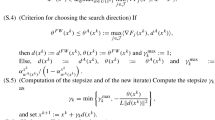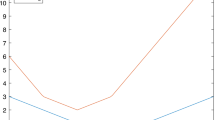Summary
We give an overview on different methods for solving nonconvex minimization problems using techniques of enumeration of extreme points. The problems considered include concave, indefinite quadratic, and special structured problems such as the concave cost network flow problem and linear complementarity. For methods that enumerate the extreme points according to the ascending order of the value of a linear underestimating function we propose new techniques for obtaining such underestimators.
Zusammenfassung
Wir geben einen Überblick über verschiedene Methoden für nicht konvexe Minimisierungsaufgaben. Insbesondere diskutieren wir Aufzählungsmethoden für Extrempunkte. Wir betrachten konkave, quadratisch indefinite Probleme ebenso wie Probleme spezieller Struktur: konkave Netzwerk-Fluß-Probleme und lineare Komplementaritäts-Probleme. Wir schlagen neue Methoden vor, um lineare untere Schranken für Aufzählungstechnicken zu erhalten.
Similar content being viewed by others
References
Al-Khayyal FA (1987) An implicit enumeration algorithm for the general linear complementarity problem. Math Progr Study 31:1–20
Balinski ML (1961) An algorithm for finding all vertices of polyhedral sets. J Soc Indist Appl Math 9:72–89
Bazara MS, Sherali HD (1981) A versatile scheme for ranking the extreme points of an assignment polytope. Naval Res Log Q 28, 4:545
Cabot VA, Francis RL (1970) Solving certain nonconvex quadratic minimization problems by ranking the extreme points. Oper Res 18:82–86.
Chvatal V (1980) Linear Programming. Freeman, New York
Burdet CA (1974) Generating all faces of a polyhedron. SIAM J Appl Math 26:72–89
Dahl G, Storoy S (1975) Decomposed enumeration of extreme points in the linear programming problem. BIT 15:151–157
Dutta A, Siegel H, Whinston A (1983) On the application of parallel architectures to a class of operations research problems. RAIRO 17, 4:317–341
Dyer ME (1983) The complexity of vertex enumeration methods. Math Oper Res 8:381–402
Dyer ME, Proll LG (1977) An algorithm for determining all extreme points of a convex polytope. Math Progr 12:81–96
Florian M (1986) Nonlinear cost network models in transportation analysis. Math Progr Study 26:167–196
Florian M, Robillard P (1971) An implicit enumeration algorithm for the concave cost network flow problem. Manag Sc 18:184–193
Gallo G, Sodini C (1979) Adjacent extreme flows and applications to min concave cost flow problems. Networks 9:95–122
Gallo G, Sandi C, Sodini C (1980) An algorithm for the min concave cost flow problem. Eu J Oper Res 4:249–255
Garsia CB (1979) The complementarity problem and its applications. Ph.D Dissertation, Rensselaer Polytechnic Institute Troy, New York
Judice JJ, Mitra G (1985) An enumerative method for the solution set of linear complementarity problems. Working Paper, Mathematics Department, Brunel University
Kaneko I, Hallman WP (1978) An enumeration algorithm for a general linear complementarity problem. Working paper WP78-11, Department of Industrial Engineering, University of Wisconsin-Madison
Linial N (1986) Hard enumeration problems in geometry and combinatorics. SIAM J Alg Discr Methods 7, 2:331–335
Lozovanu DD (1982) Properties of optimal solutions of a grid transport problem with concave cost function of the flow on the arcs. Engin Cybern 20:34–38
Matheiss TH, Rubin DS (1978) A survey and comparison of methods for finding all vertices of convex polyhedral sets. Math Oper Res 5:167–185
McKeown PG (1978) Extreme point ranking algorithms: A computational survey. In: Computers and Mathematical Programming. White WW (ed) National Bureau of Standards Special Publication 502, U. S. Government Printing Office, Washington DC, pp 216–222
Manas M (1968) An algorithm for a nonconvex programming problem. Econ Math Obzor Acad. Nacl. Ceskoslov, pp202–212
Manas M, Nedoma J (1974) Finding all vertices of a convex polyhedral set. Numer Math 9:35–39
Martos B (1975) Nonlinear Programming: theory and methods. North-Holland, New York
Murty KG (1968) Solving the fixed charge problem by ranking the extreme points. Oper Res 18:268–279
Murty KG (1972) An algorithm for finding all feasible complementary bases for a linear complementary problem. Technical Report 72-2, Department of Industrial Engineering, University of Michigan
Murty KG (1983) Linear Programming. Wiley, New York
Pardalos PM, Rosen JB (1986) Global concave minimization: A bibliographic survey. SIAM Rev 26, 3:367–379
Pardalos PM (1986) An algorithm for a class of nonlinear fractional problems using ranking of the vertices. BIT 26: 392–395
Rosen JB, Pardalos PM (1986) Global minimization of large scale constrained concave quadratic problems by separable programming. Math Progr 34:163–174
Rossler M (1973) A method to calculate an optimal production plan with a concave objective function. Unternehmensforschung 20:373–382
Schmidt BK, Mattheiss TH (1980) Computational results on an algorithm for finding all vertices of a polytope. Math Progr 18:308–329
Storoy S (1983) Ranking of vertices in the linear fractional programming problem. BIT 23, 3:403–405
Storoy S (1986) Parallel vertex enumeration: A holistic approach. Report No. 18, Department of Informatics, University of Bergen, Norway
Taha HA (1973) Concave minimum over a convex polyhedron. Naval Res Logist Q 20:353–355
Valiant LG (1979) The complexity of enumeration and reliability problems. SIAM J Comput 8:410–421
Wallace SW (1985) Pivoting rules and redudancy schemes in extreme point enumeration. BIT 25:274–280
Zangwill WI (1968) Minimum concave cost flows in certain networks. Manag Sci 14:429–450
Author information
Authors and Affiliations
Rights and permissions
About this article
Cite this article
Pardalos, P.M. Enumerative techniques for solving some nonconvex global optimization problems. OR Spektrum 10, 29–35 (1988). https://doi.org/10.1007/BF01720032
Received:
Accepted:
Issue Date:
DOI: https://doi.org/10.1007/BF01720032




